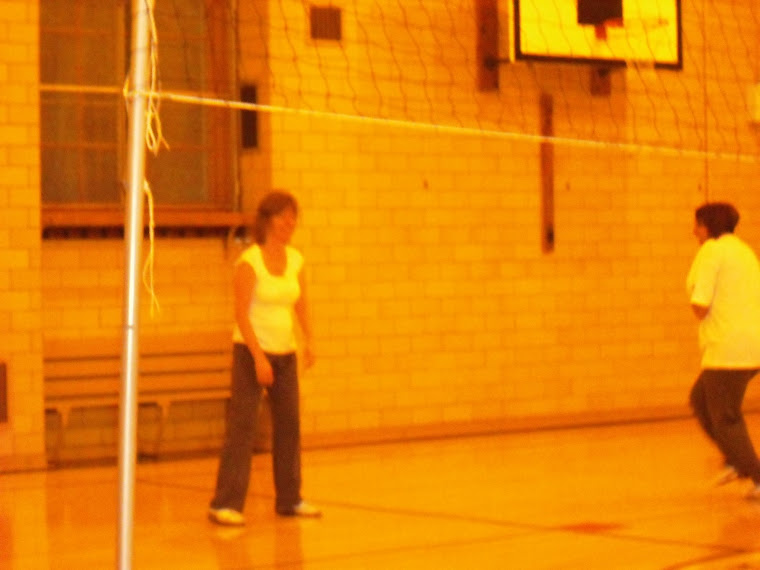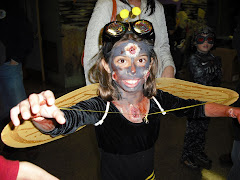Tuesday, December 18, 2012
Sandy Hook Elementary School Tragedy
Dear Parents/Guardians:
There are no words that would make sense of the incomprehensible horror of Friday’s school shootings in Newtown, Connecticut. Our hearts go out to the families who have experienced such devastating loss. However, we want to assure you that our school takes your children’s safety very seriously. In fact, it is our number one priority! This past school year, the NYC Department of Education instituted a General Response Protocol (GRP) for all schools, as described in a letter we backpacked home early last week. The GRP is used across the country as a way of standardizing our response to disasters and other dangerous events. Our staff receives ongoing training in these protocols so that we can react to any emergency that may arise.
We also have a Building Response Team (BRT) that has received certification in emergency preparedness from FEMA. We will continue to drill and practice to make sure that our students and staff can react with automaticity.
With that said, there are things that we can do to make our building safer:
We must be vigilant in ensuring that all doors remain closed. Sometimes people exit the building without going past our wonderful security agents. If you see a door open, please SHUT IT. All staff members will be reminded as well.
Please don’t be angry when the Safety Agents ask to see your I.D. It is their responsibility to make sure that all visitors are properly screened. Each visitor should receive a VISITOR’S PASS label, and wear it.
If you have not done so already, register to receive NOTIFY NYC alerts. You can register at notifynyc.gov or call 311 to receive telephone updates in times of emergency.
Please update all important information on your children’s blue cards. We will not release a child to someone who comes to pick up a student if their name does not appear on the all-important blue card. I know that some parents have been annoyed with our overzealousness in this regard. Again, we take your children’s safety very seriously.
We do want to let you know that members of our school’s Crisis Intervention Team are available to speak to you or your child if these services are needed. Our mental health staff (school psychologist, social workers, guidance counselor) is trained to deal with these situations. Please reach out to us if you need to avail yourself or your children of these services. We sent out an e-mail on Friday night to Class Parents with resources for parents for dealing with traumatic events in school (attached for your reference). We also posted these resources on the school’s blog: http://holliswoodschool.blogspot.com
Lastly, we would like to say that during these troubling times, the Holliswood School community will do what it always does when there is a crisis. We will band together to support each other through these traumatic and devastating times. We will find strength in each other.
Friday, December 14, 2012
Tragedy in Connecticut School
Dear School Community:
What happened in Connecticut is absolutely horrific. At this time, I am so saddened to hear about all of the events that took place. We will review our GRP protocols with our staff next week and hold a Building Response Team Meeting on Monday.
In the meantime, please use the following guide for any questions your children may have about this tragedy. A parent/guardian letter will be issued next week and backpacked home. For your information, in the month of December, we have had three safety assemblies, including one with the Office of Emergency Management.
**Talking to Children About Violence: Tips for Parents and Teachers
**High profile acts of violence, particularly in schools, can confuse and frighten children who may feel in danger or worry that their friends or loved-ones are at risk. They will look to adults for information and guidance on how to react. Parents and school personnel can help children feel safe by establishing a sense of normalcy and security and talking with them about their fears.
**1. Reassure children that they are safe. Emphasize that schools are very safe. Validate their feelings. Explain that all feelings are okay when a tragedy occurs. Let children talk about their feelings, help put them into perspective, and assist them in expressing these feelings appropriately.
**2. Make time to talk. Let their questions be your guide as to how much information to provide. Be patient. Children and youth do not always talk about their feelings readily. Watch for clues that they may want to talk, such as hovering around while you do the dishes or yard work. Some children prefer writing, playing music, or doing an art project as an outlet. Young children may need concrete activities (such as drawing, looking at picture books, or imaginative play) to help them identify and express their feelings.
**3. Keep your explanations developmentally appropriate.
• Early elementary school children need brief, simple information that should be balanced with reassurances that their school and homes are safe and that adults are there to protect them. Give simple examples of school safety like reminding children about exterior doors being locked, child monitoring efforts on the playground, and emergency drills practiced during the school day.
• Upper elementary and early middle school children will be more vocal in asking questions about whether they truly are safe and what is being done at their school. They may need assistance separating reality from fantasy. Discuss efforts of school and community leaders to provide safe schools.
• Upper middle school and high school students will have strong and varying opinions about the causes of violence in schools and society. They will share concrete suggestions about how to make school safer and how to prevent tragedies in society. Emphasize the role that students have in maintaining safe schools by following school safety guidelines (e.g. not providing building access to strangers, reporting strangers on campus, reporting threats to the school safety made by students or community members, etc.), communicating any personal safety concerns to school administrators, and accessing support for emotional needs.
**4. Review safety procedures. This should include procedures and safeguards at school and at home. Help children identify at least one adult at school and in the community to whom they go if they feel threatened or at risk.
**5. Observe children’s emotional state. Some children may not express their concerns verbally. Changes in behavior, appetite, and sleep patterns can indicate a child’s level of anxiety or discomfort. In most children, these symptoms will ease with reassurance and time. However, some children may be at risk for more intense reactions. Children who have had a past traumatic experience or personal loss, suffer from depression or other mental illness, or with special needs may be at greater risk for severe reactions than others. Seek the help of mental health professional if you are at all concerned.
**6. Limit television viewing of these events. Limit television viewing and be aware if the television is on in common areas. Developmentally inappropriate information can cause anxiety or confusion, particularly in young children. Adults also need to be mindful of the content of conversations that they have with each other in front of children, even teenagers, and limit their exposure to vengeful, hateful, and angry comments that might be misunderstood.
**7. Maintain a normal routine. Keeping to a regular schedule can be reassuring and promote physical health. Ensure that children get plenty of sleep, regular meals, and exercise. Encourage them to keep up with their schoolwork and extracurricular activities but don’t push them if they seem overwhelmed.
Suggested Points to Emphasize When Talking to Children
• Schools are safe places. School staff work with parents and public safety providers (local police and fire departments, emergency responders, hospitals, etc.) to keep you safe.
• The school building is safe because … (cite specific school procedures).
• We all play a role in the school safety. Be observant and let an adult know if you see or hear something that makes you feel uncomfortable, nervous or frightened.
• There is a difference between reporting, tattling or gossiping. You can provide important information that may prevent harm either directly or anonymously by telling a trusted adult what you know or hear.
• Don’t dwell on the worst possibilities. Although there is no absolute guarantee that something bad will never happen, it is important to understand the difference between the possibility of something happening and the probability that it will affect our school.
• Senseless violence is hard for everyone to understand. Doing things that you enjoy, sticking to your normal routine, and being with friends and family help make us feel better and keep us from worrying about the event.
• Sometimes people do bad things that hurt others. They may be unable to handle their anger, under the influence of drugs or alcohol, or suffering from mental illness. Adults (parents, teachers, police officers, doctors, faith leaders) work very hard to get those people help and keep them from hurting others. It is important for all of us to know how to get help if we feel really upset or angry and to stay away from drugs and alcohol.
• Stay away from guns and other weapons. Tell an adult if you know someone has a gun. Access to guns is one of the leading risk factors for deadly violence.
• Violence is never a solution to personal problems. Students can be part of the positive solution by participating in anti-violence programs at school, learning conflict mediation skills, and seeking help from an adult if they or a peer is struggling with anger, depression, or other emotions they cannot control.
Subscribe to:
Comments (Atom)
About Parent Coordinator Phyllis Corley
My name is Phyllis Louise Lattimer-Corley. I am married and have one son.
I was the educational director of a day care center in Nassau County for sixteen years prior to the birth of my son. I planned to be a stay-at- home mom for five years until my son went to kindergarten. Well, that didn’t happen! I got involved in his elementary school, PS 178, first as a class parent, then in the library, and later became PTA president for three years.
When my son moved on to middle school at MS 74, I again took on the role of PTA president for two years. Gee, I guess I wasn’t really staying at home. My son, James is now a freshman at Binghamton University. I am fortunate to be writing this blog, as I enter my sixth year as parent coordinator of my son’s wonderful alma mater.
Welcome to our school family. I am looking forward to an exciting school year. There are so many fantastic activities that have been planned for both you and your child. I encourage all parents to be partners in your child’s school.
Ø Attend Parent Teacher Conferences
Ø Go to PTA Meetings
Ø Participate in Parent Workshops
Ø Volunteer to help at school events.
I am here to assist you in any way that I can. Please feel free to contact me with any concerns or just stop by for a cup of coffee.
Phyllis Corley,
Parent Coordinator
I was the educational director of a day care center in Nassau County for sixteen years prior to the birth of my son. I planned to be a stay-at- home mom for five years until my son went to kindergarten. Well, that didn’t happen! I got involved in his elementary school, PS 178, first as a class parent, then in the library, and later became PTA president for three years.
When my son moved on to middle school at MS 74, I again took on the role of PTA president for two years. Gee, I guess I wasn’t really staying at home. My son, James is now a freshman at Binghamton University. I am fortunate to be writing this blog, as I enter my sixth year as parent coordinator of my son’s wonderful alma mater.
Welcome to our school family. I am looking forward to an exciting school year. There are so many fantastic activities that have been planned for both you and your child. I encourage all parents to be partners in your child’s school.
Ø Attend Parent Teacher Conferences
Ø Go to PTA Meetings
Ø Participate in Parent Workshops
Ø Volunteer to help at school events.
I am here to assist you in any way that I can. Please feel free to contact me with any concerns or just stop by for a cup of coffee.
Phyllis Corley,
Parent Coordinator
Corley's Corner

Parents and Staff turn out for Corley's Ladies' Night at Strike Long Island (November 2008)

Mrs. Corley gets ready to read at the Barnes and Noble Fundraiser Event
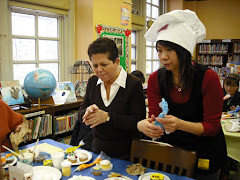
Parents and Staff participate in Corley's Cupcake Creations Parent Workshop
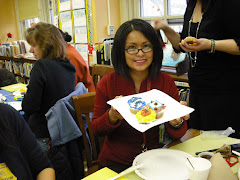
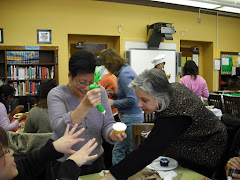
Our Student Council Gives Back!

2009 Student Council President Chrysalis Terrado and her cabinet pose in front of dozens of toys donated by Holliswood families for our annual toy drive (December 2008)
Holliswood in the News
Upcoming School Closings and Half Days
To view the official NYC Dept. of Education 2013-2014 School Calendar, visit
http://schools.nyc.gov/NR/rdonlyres/D45BBFC5-BB4E-4C6B-ACE7-F7E15D8AA1BE/0/20132014SchoolYearCalendar.pdf
It is also anticipated that we will add half days for professional development for our faculty during the 2013-2014 school year (subject to UFT and PTA approval). An announcement will be made.
In the event of an emergency closing or delayed opening due to weather, please call 311 or watch your local news channels. When NYC public schools are closed, our school will be closed.
Monthly Events
Every month, you will receive a calendar of our monthly events.







